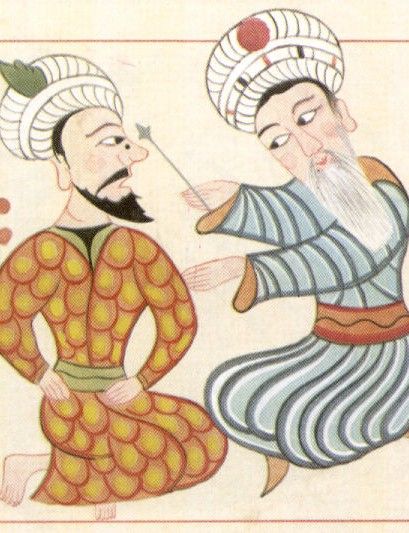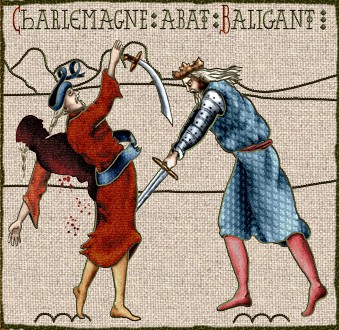King Charles notices the sun starting to set as the warriors travel onward to take vengeance on the pagans. He stops and prays to God in order to ask him to hold the sun in place. God sends an angel to tell Charlemagne that he can continue traveling without having to worry about the night approaching and the men journey ahead. They purse the pagans until their only escape is the Ebro river. Their enemy continues into the water praying to their god for help. The book consistently gives reason to the idea that the only true God is the one that Charlemagne worships. The author could be considered bias but the writing at this time period was continually Christian based. Marsilion's men end up drowning in the river. At this sight Charlemagne bows down and gives thanks to God. He then tells his men that they will make camp there, in order to give themselves and their horses rest. All the men sleep out of exhaustion and grief for their losses. The King is sent a few dreams, from God through Saint Gabriel, that make him distraught.
King Marsilion flees to Spain and is so beaten that he faints. The Queen and towns people are so upset about the loss they go to the temple of their god and destroy his shrine.
Jump back to the beginning of Charlemagne's seven year attack on Spain. From the start King Marsilion does everything in his power to disrupt the advances of the French. He sends out letters in order to gain allies in this fight. The Babylon leader only gives a reply after King Marsilion's last attempt of ridding Spain of Charlemagne. In order to help the pagans Baligant, the Babylon leader, sends warships to help in the resistance against the Christians. After arriving at Saragossa Baligant boast of how he will defeat Charlemagne. He sends for King Marsilion to join him in the battle that he will wage. The messengers arrive to a troubled city. The towns people, and the leadership do not believe in the ability of their gods to help them in any way. King Marsilion laments how he was only wounded in battle and was not able to die a hero's death. He tells the messengers that they can find Charlemagne by the Ebro river and if Baligant is willing to protect Spain from the Christians he will be given the land. The messengers return to Baligant and relay all that has happened recently between the Franks and the pagans. The Babylonian leader is elated to
 |
| http://forum.paradoxplaza.com/forum/showthread.php ?644804-In-the-Footsteps-of-Charlemagne- The-Second-Coming-of-House-Karling/page3 |
King Charles and his men ride back to the site of the battle and mourn over their losses. The leader finds his nephew's, Roland's, body. He griefs and laments over the life lost and final absolves to continually grieve over the lost warrior. All the bodies except that of the three leaders are then gathered and laid to rest. The grieving knights give a proper burial in order to guarantee them blessings and honors. Roland, Oliver, and the Archbishop's bodies are all wrapped up in fine linen in order to be carted back to their homeland.
The Babylonian messengers ride up and announce the battle to come. The French prepare for battle and gather into different specified ranks. Overall Charlemagne has ten divisions in total. He gets down from his horse and prays to God to avenge his nephew's death if it is his will. He makes reference to many bible stories in his prayer as examples of other moments in history when God granted miracles. The French then continue to prepare for battle.
The pagan messengers then join back up with their comrades. They inform Baligant that Charlemagne's men will never abandon their leader. The pagan's then prepare for battle, as well. The author continues to discuss how great of a man Baligant would be if he were only a Christian. This understanding centers on the focus of Christian ideals being spread throughout the land as the only correct form of thinking. Malpramis, Baligant's son, asks his father for the first blow of the battle. The leader is proud to give this honor to his son and promises him land if he should live to see another day. The author foreshadows the demise of Malpramis when he explains that the warrior will never be honored with the land. The pagans also form into divisions. Overall they have three sets of ten divisions equaling to thirty legions.
As the two sides go into their final preparations, prayers are said to either sides being. Boast and threats are exchanged between the two armies. Both sides know the battle to come will be a hard fight. They have seen the abilities of the opposing side and understand what is to come.
The battle begins with battle cries and the first blows are attributed to the Franks. Soon after, strikes are seen throughout the battlefield. Many men are wounded or killed from both armies. Throughout the battle Baligant and Charlemagne are heard inspiring the fighting spirits of their men. As the battle rages on it is apparent that the pagans are losing many of their good warriors. Baligant ends up losing both his son and his brother. After he hears news of this loss he begins to start questioning the existence of his god and possibly the truth of Charlemagne's God. The battle continues and through the slaughter of many warriors the two Kings come upon each others presence. Only through the recognition of each others voices do they realize their proximity. The two Kings know that this battle will end in death for one of them. Baligant demands that Charlemagne admit to killing his son and become his vassal in order to "right the wrong". King Charles refuses to grant peace or love to a pagan and tries to convert the Babylonian leader. At a stale mate with words, they progress into physical strikes.
Baligant gets the first fatal blow and strikes Charlemagne in the head. This hit almost kills the French leader but, because it is not the will of God that Charlemagne dies, Saint Gabriel is sent down to push him onward. The leader hears the angel's voice and loses all fear. He immediately counters the blow with his own strike to Baligant's head which proves fatal. The Babylonian leader lays dead on the ground while
 |
| http://lachansonderoland.d-t-x.com/pages/FRpagenotes03Ah.html#baligant1 |
As they travel back to France, Charlemagne leaves Roland's olifant with gold and pagan coins in Bordeaux on the altar of the Saint Sevrin church. He lays to rest Roland, Oliver, and the Archbishop at the Saint-Romain church. They continue onward until they arrive at Aix. Charlemagne calls together his judges in order to begin Ganelon's trial.
Aude, who was promised to marry Roland upon his return, ask the king of her love's whereabouts. The king is grieved to tell her the sad news of Roland's death. After hearing of his demise, Aude dies. King Charles only thinks the girl has fainted and tries to revive her. He final understands the situation and has her buried the next day with many honors.
Ganelon is stationed before the palace and tied to a stake. He is beaten with many objects as he waits for his trial. At the trial, Ganelon tries to argue that he was working under the influence of revenge and not treason. The heart of the trial is not based off the action but the motive. Ganelon fully admits to plotting with the pagans but his motives were out of vengeance not treason. The judges discuss amongst themselves and all but Tierri conclude that nothing will bring back Roland and Ganelon is still willing to serve Charlemagne with love and loyalty. During the counsel Pinabel tells Ganelon he will "...give him the lie with this steel sword" (274.3791). After hearing the verdict Charlemagne calls all the judges traitors. Tierri then calls attention to the fact that Ganelon may not be a traitor to Roland but he is to Charlemagne. He cements this judgement with his sword and Pinabel challenges him. Not only does he place a challenge Pinabel also puts up the lives of his kinsmen for the judgement of innocence.
The men prepare for the duel and are absolved of their sins. The room is set and the fight begins. Early on in the skirmish both men try to convince the other to surrender. Neither is willing to give up their claim and the battle is fated that one must die. Pinabel wounds Tierri but it is not his day to die so God saves the warrior. Tierri then strikes Pinabel with a fatal blow and Ganelon's judgement is made. To live up to Pinabel's challenge, his kinsmen are scheduled to be hanged. The loyalty of Tierri is recognized by Charlemagne and
 |
| http://nobility.org/2011/09/08/nobility-of -blood-is-a-powerful-stimulus-for-the-practice-of-virtue/ |
The pagan Queen is then baptized and given the Christian name, Juliana. As Charlemagne lays down to rest he hears Saint Gabriel call to him. The angel tells the King he must ride to the land of Bire. King Vivien had been besieged by the pagans and the Christians were crying out for Charlemagne.
Thus ends the story.



